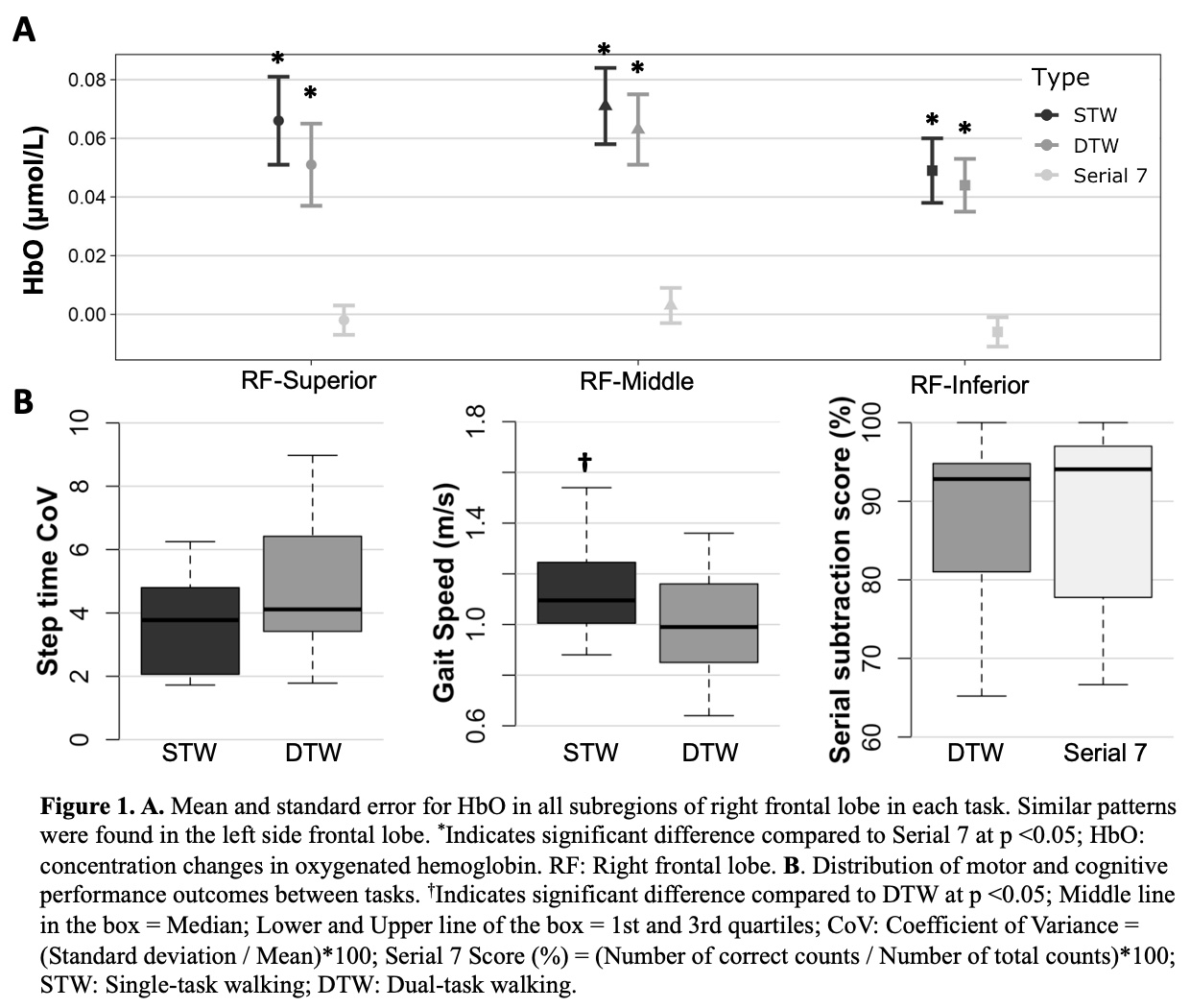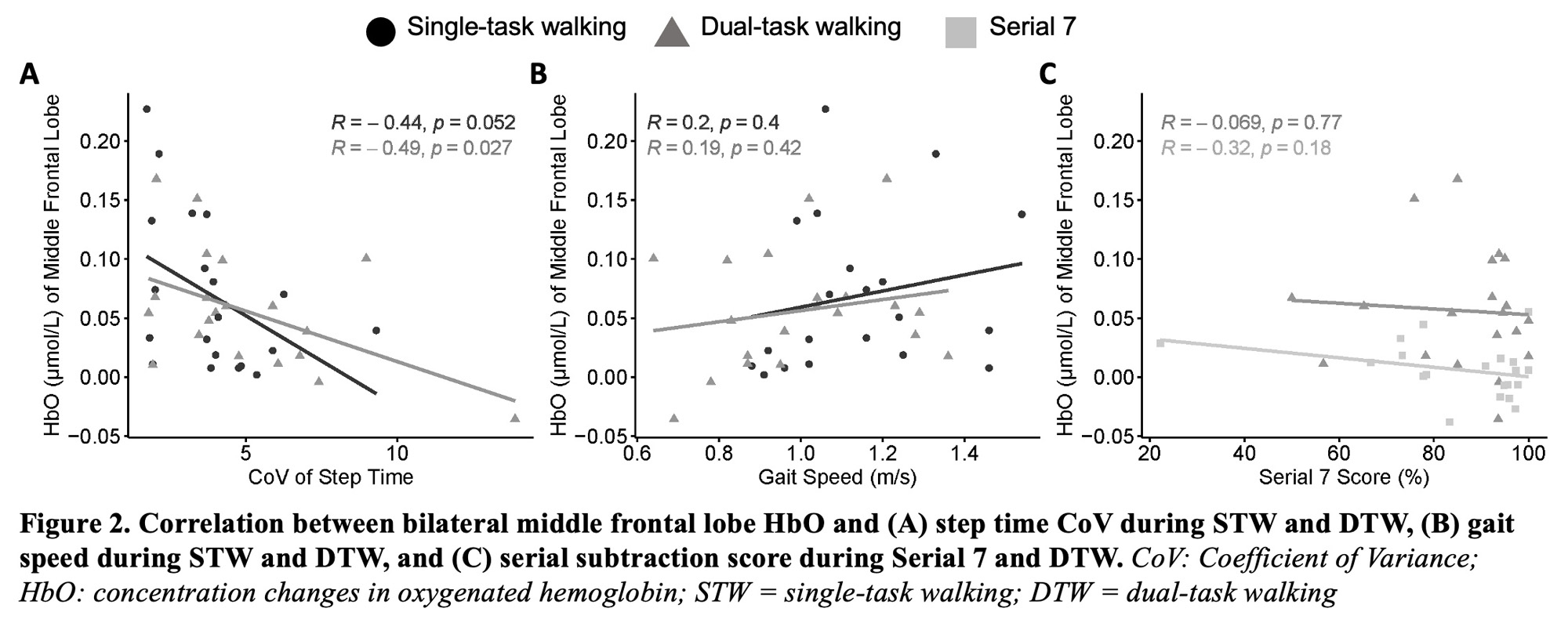Session Information
Session Type: Poster Session A
Session Time: 9:00AM-11:00AM
Background/Purpose: Altered gait patterns, including high variability or muscular co-contraction, can increase fall risk and worsen disease progression in people with knee osteoarthritis (OA). However, the neural substrates underlying altered motor performance during walking in this population are unknown. Over-recruitment and reduced frontal lobe capacity during walking with or without a cognitive task have been reported in other populations with gait impairments but have not been examined in knee OA. Our objectives were (1) to assess frontal lobe activation during single- and dual-task walking in people with knee OA and (2) to examine the association of frontal lobe activation with motor and cognitive performance.
Methods: Individuals with symptomatic knee OA (n=20, Table 1) completed three tasks, (1) single-task walking (STW) at a self-selected pace for 8 bouts of 30s interspersed with 11-15s standing periods, (2) subtraction by 7 from a 3-digit number while seated (Serial 7), and (3) dual-task walking (DTW), a combination of STW and Serial 7. During these tasks, participants wore a functional Near-Infrared Spectroscopy (fNIRS) device to assess frontal lobe activation and inertial sensors on the trunk and legs for gait assessment. Activation in bilateral superior, middle, and inferior frontal lobes was assessed as the change in oxygenated hemoglobin concentration (HbO) in each task relative to quiet standing or sitting. Motor performance during walking was assessed as step time coefficient of variance (CoV) and gait speed. Cognitive performance was assessed as the percentage of correct counts during serial subtraction. We used repeated measures ANOVA to compare the outcomes between tasks and assessed the correlation between middle frontal lobe HbO and motor and cognitive performance in each task.
Results: Frontal lobe HbO was higher during STW and DTW compared to Serial 7 but not significantly different between STW and DTW (Figure 1A). Step time CoV was not different between STW and DTW, but gait speed was lower during DTW; cognitive performance was not different between Serial 7 and DTW (Figure 1B). Greater middle frontal lobe HbO was correlated with lower step time CoV during STW and DTW; none of the other correlations were significant (Figure 2).
Conclusion: Greater frontal lobe HbO during STW and DTW vs. Serial 7 suggests a greater need for executive control during walking. This is supported by the correlation between higher frontal lobe activation and lower gait variability (i.e., better motor performance). However, an absence of a further increase in HbO from STW to DTW reflects a lack of additional executive resources (i.e., ceiling effect). This is aligned with prior studies in other populations with gait impairments (e.g., Post-stroke, Parkinson’s Disease). It also appears that people with knee OA prioritized the cognitive task during DTW given the deterioration in motor task performance compared to STW but similar cognitive performance compared to Serial 7. This may increase their risk for instability or falls during real-world walking conditions that typically require dual-tasking, and interventions to improve dual-task walking performance may need to be considered.
To cite this abstract in AMA style:
Lee S, Yücel M, Ferre C, Cha B, Kim E, Kumar D. Frontal Lobe Activation and Gait Alterations During Single- and Dual-task Walking in People with Knee Osteoarthritis: A Functional Near-infrared Spectroscopy Study [abstract]. Arthritis Rheumatol. 2023; 75 (suppl 9). https://acrabstracts.org/abstract/frontal-lobe-activation-and-gait-alterations-during-single-and-dual-task-walking-in-people-with-knee-osteoarthritis-a-functional-near-infrared-spectroscopy-study/. Accessed .« Back to ACR Convergence 2023
ACR Meeting Abstracts - https://acrabstracts.org/abstract/frontal-lobe-activation-and-gait-alterations-during-single-and-dual-task-walking-in-people-with-knee-osteoarthritis-a-functional-near-infrared-spectroscopy-study/



